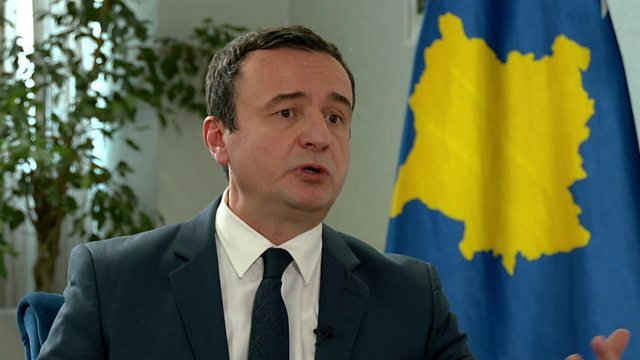Prime Minister Albin Kurti has stated that through the operationalization of the Institute for Crimes Committed During the War, one of the obligations towards the memories of the people and the demand for justice is being fulfilled.
Recalling the 25th anniversary of the Serbian forces’ massacre in the villages of Krusha e Madhe, Krusha e Vogel, and Padalishte, Kurti wrote on Facebook that these are evidence of the Serbian genocide “that with police and military forces, tried to exterminate the Albanians in Kosovo.”
“In the spring of 1999, Serbia was executing the genocidal plan “Patkoi” for the extermination of the indigenous Albanian population in Kosovo. On the morning of March 26, Serbian forces attacked the villages of Krusha e Madhe and Krusha e Vogel. They forced women and children to leave for Albania. Men and boys were detained. Their IDs and valuable items were confiscated. Then they opened fire on them with machine guns. The shooting lasted several minutes. That day, Serbian forces killed 243 Albanian civilians in the massacre in Krusha e Madhe and 113 in Krusha e Vogel.”
He also commemorated the massacre of the Berisha family in Suhareke, where 48 members of the Berisha family were killed, including 11 children.
“In the early hours of the morning of March 26, Serbian tanks surrounded the yard of the Berisha family in Suhareke. They drove the family members out of their homes and took them to a cafe. Then they opened fire. Explosives were also thrown. Serbian forces there killed 48 members of the Berisha family, including 11 children. Among them, 3-year-old Dorentina, 2-year-old Ismet, while Eroni and Redoni were only 1 year old. Their bodies were sent to a mass grave in Batajnica, near Belgrade. Only Shyhrete Berisha and Vjollca with her son, Gramoz Berisha, survived this massacre.”
On the same day, Kurti said that Serbian forces attacked the village of Padalishte in Skenderaj, massacring 19 members of the Imeraj family, the village of Landovica in Prizren where 23 residents were killed, and Gjakova where 6 men were killed.
“That same morning, Serbian forces attacked the village of Padalishte in Skenderaj, massacring 19 members of the Imeraj family, aged 2 to 76. Among them were 11 women and five children. In Landovica in Prizren, on March 26, 1999, 23 residents of this village and other villages, including six children and a pregnant woman, were killed. In the evening, in the city of Gjakova, in a house on “Ymer Grezda” street, Serbian forces killed with firearms the six Albanian men who were in that house.”
Kurti stated that these are evidence of Serbia’s genocide.
“These are the proofs of Serbia’s genocide, which with police and military forces, tried to exterminate the Albanians in Kosovo. “Kosova’s Memory” is the title of the volume of books with testimonies and stories of survivors of the Krusha e Madhe massacre, which was promoted last night, with the support of the Ministry of Culture, Youth, and Sports. Kosovo’s memory is fresh.”
Prime Minister Kurti mentioned the establishment and operationalization of the Institute for War Crimes.
“The establishment and operationalization of the Institute for Crimes Committed During the War aims to document all the war crimes of the last war in Kosovo, crimes against humanity, and genocidal actions by Serbia. This is one of the many obligations that is being fulfilled towards our memories as a people and the demand for justice. As institutions of the Republic, we are committed to ensuring that the current generation of children and future generations, who have not yet been born, do not go through the sufferings we went through. As institutions and citizens of the Republic, we are jointly engaging, so that children enjoy freedom and have a bright future in our Kosovo. We bow with much pain, love, and pride to the memory of all the slain. Their fall, with sacrifice and offering, is our guide on how to move forward. May their memory be eternal! May their glory be everlasting!”
Source: Botasot.net







